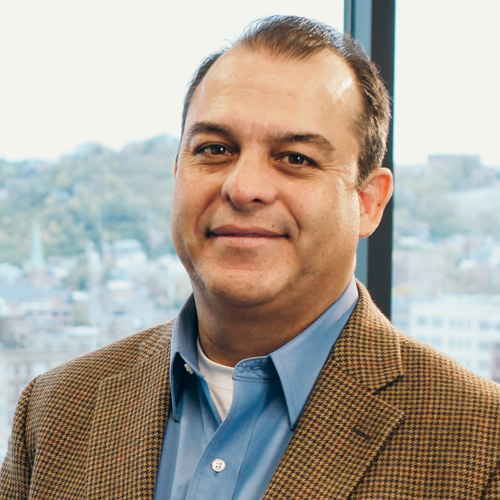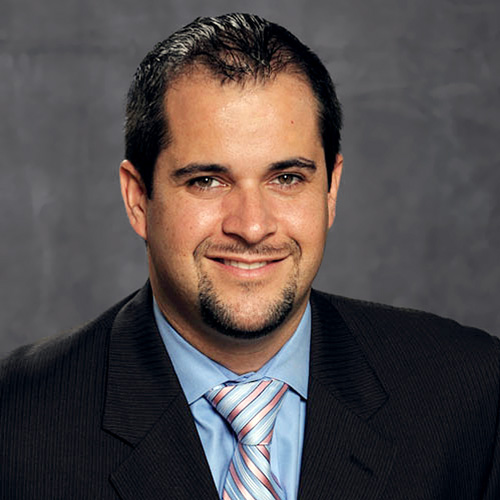Reach out to me if you ever feel pinned on the beach,” Ray Dorado tells his team at Citizens Financial Group.
The phrase, he explains, is an old war-time expression used to describe that awful realization that you’re trapped by enemy fire and need more support during a critical point in time. Having felt that way himself and seen others in similar situations countless times over nearly three decades as an attorney in the financial services industry, Dorado has developed strategic and practical solutions to coming out on top.
He wants to be the guy his colleagues call when they’re in a jam.
Dorado has been in the executive vice president and deputy general counsel role at Citizens Financial Group for nearly two years. He leads the enterprise regulatory and commercial banking legal teams of the east coast banking leader.
The opportunity came about after Dorado had a conversation with Stephen Gannon, Citizens’ general counsel and chief legal officer. Dorado and Gannon already knew each other through their industry committee work at trade associations. Gannon was setting up a team to help Citizens Financial separate from its now-former parent company, the Royal Bank of Scotland, when he tapped industry veteran Dorado to come on board.
“It sounded like an exciting opportunity to go to a smaller organization that was going through significant change,” Dorado says.
Indeed, this was familiar territory for Dorado, whose extensive experience in financial legal services includes senior leadership roles and long tenures at Credit Suisse and BNY Mellon, sixteen and eleven years respectively. He was at BNY Mellon during the 2008 financial crisis and played a key role in managing the bank’s legal risks as one of the two US clearing banks, as well as overseeing its activities as financial advisor and custodian bank to the US Treasury for the Trouble Asset Relief Program (TARP).
“Both of those organizations went through significant mergers, market trauma, organizational changes, and remediation efforts while I was there,” he says. “These came with a host of complex legal and regulatory issues that had to be addressed, and that experience has prepared me for my mission and role at Citizens.”
While at Citizens, Dorado worked to demonstrate to the bank’s regulators that Citizens is an extremely capable and disciplined organization on its own after the deconsolidation from its former
parent company.
“On the cultural side, I think it’s pushing the culture of the organization to be more proactive in its approach, not just reactive,” he says. “There was already a tendency toward being more proactive when I got here, but I’ve pushed the organization from where I sit to take it to the next level.”
“Increasing regulation is a given in the financial services business, and we have to be ready to do what it takes not only to keep pace but to lead.”
Ray Dorado
Dorado is particularly proud of the company culture at Citizens, which he says is focused on the customer and the customer experience, not to mention its other constituents—communities, investors, regulators, and colleagues.
“We have a company credo, and that’s to perform our best every day in order to do more for all of our constituents,” he says, adding that there is a company-wide recognition and rewards program for individuals who demonstrate the attributes of the credo.
There is also Citizens’ commitment to community service, which Dorado says was “a real plus” when he decided to join. He is currently involved with providing legal services to children who have come to the United States on their own without their parents. He is doing this work through Greenberg Traurig, a law firm partner of Citizens Financial, which works with the Kids in Need of Defense (KIND) Program.
Dorado’s own parents originally came to the United States from Cuba, and some members of his family came via Operation Pedro Pan, a program that brought thousands of Cuban children to the United States from 1960 through 1962.
“The KIND Program one really hit home for me,” he says. “I have seen the benefits that can accrue by addressing a child’s needs when they’re on their own, and I’ve seen how successful those individuals can be when given the chance.”
In an industry with regulations that constantly evolve and change, keeping teams energized can be a challenge, but it’s a high priority for Dorado, who wants to keep his teams on track and make sure they know he has their back. He holds regular one-on-one meetings with his direct reports as well as team meetings, and wants to make sure they know the lines of communication are always open.
“Increasing regulation is a given in the financial services business, and we have to be ready to do what it takes—not only to keep pace but to lead,” he says. “It requires lots of strategic thinking and good communication to be efficient and timely, and to consistently meet or exceed the new requirements and expectations. It’s a continuous challenge and one that requires a high level of energy, discipline, and focus.”
Dorado’s high level of energy is palpable and positivity is contagious. Having a strong culture of service seems to be a key component of the strategy that is going to help Citizens reach its goals moving forward.
“We want to be a top-performing bank, and I’m committed to getting us there,” he says. “We’ve made a lot of progress so far, and I look forward to the next steps on our journey.”
- Citizens operates more than 1,200 branches and approximately 3,200 ATMs across
11 states - Though originally established in 1828, Citizens Financial just recently began trading on the New York Stock Exchange under the ticker symbol CFG on September 24, 2014
- In June 2016, it was announced that Citizen’s Financial Group had joined the Fortune 500 for the first time
- Citizens Financial Group is one of the nation’s oldest and largest financial institutions, with $147 billion in assets as of September 30, 2016

